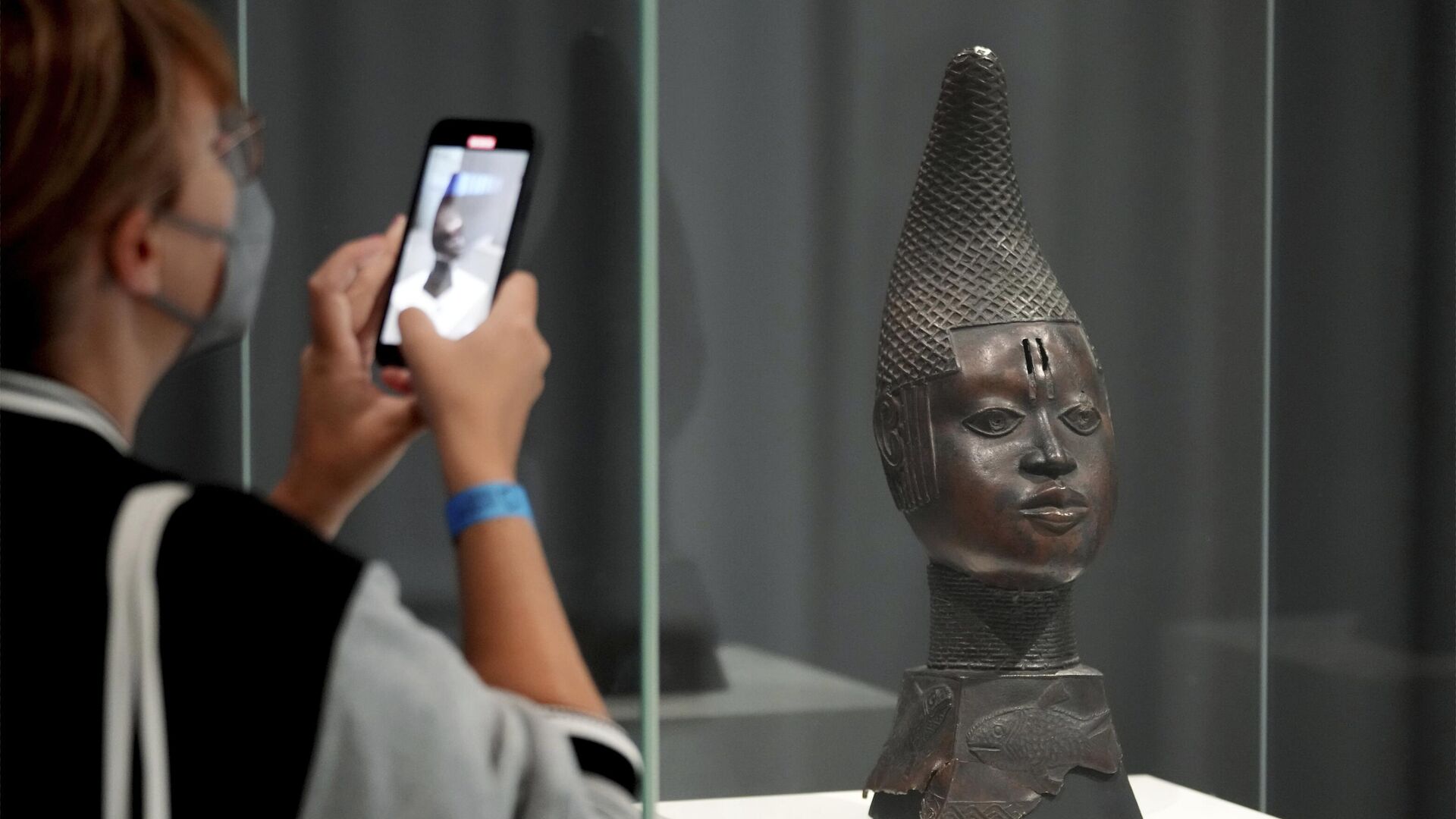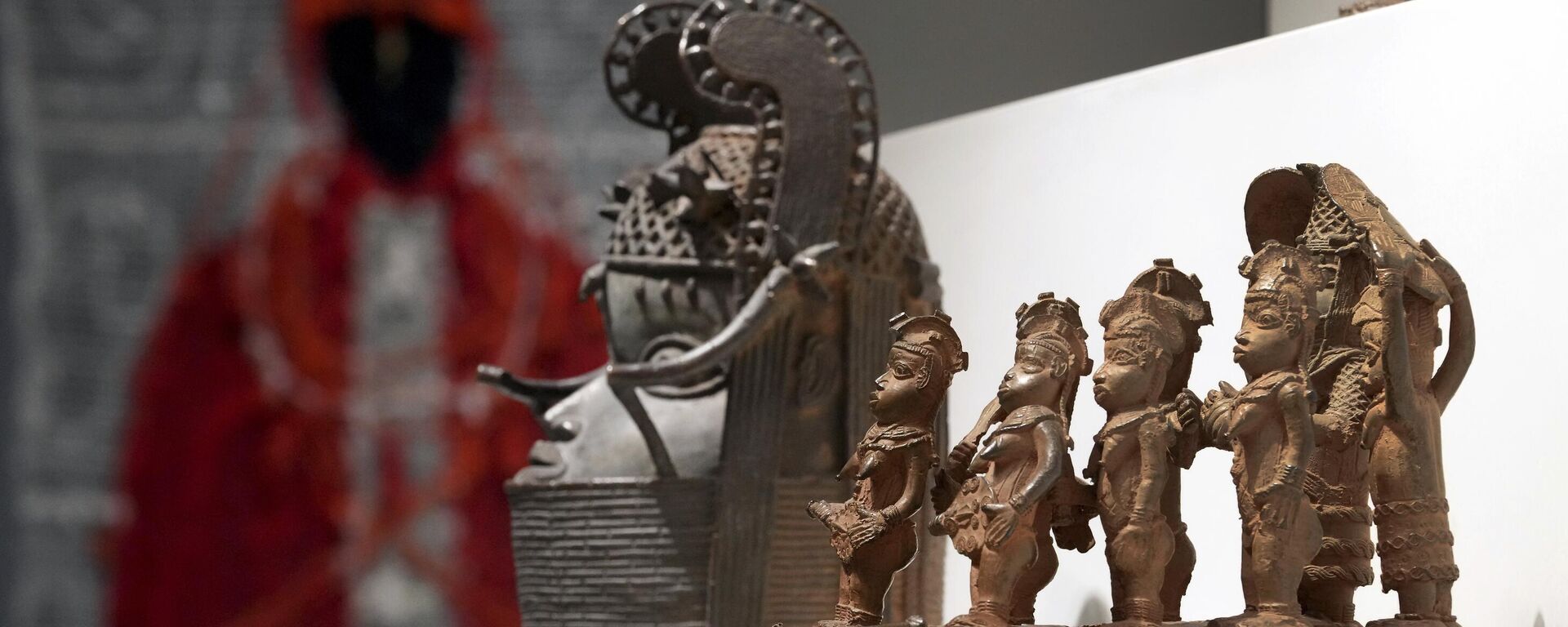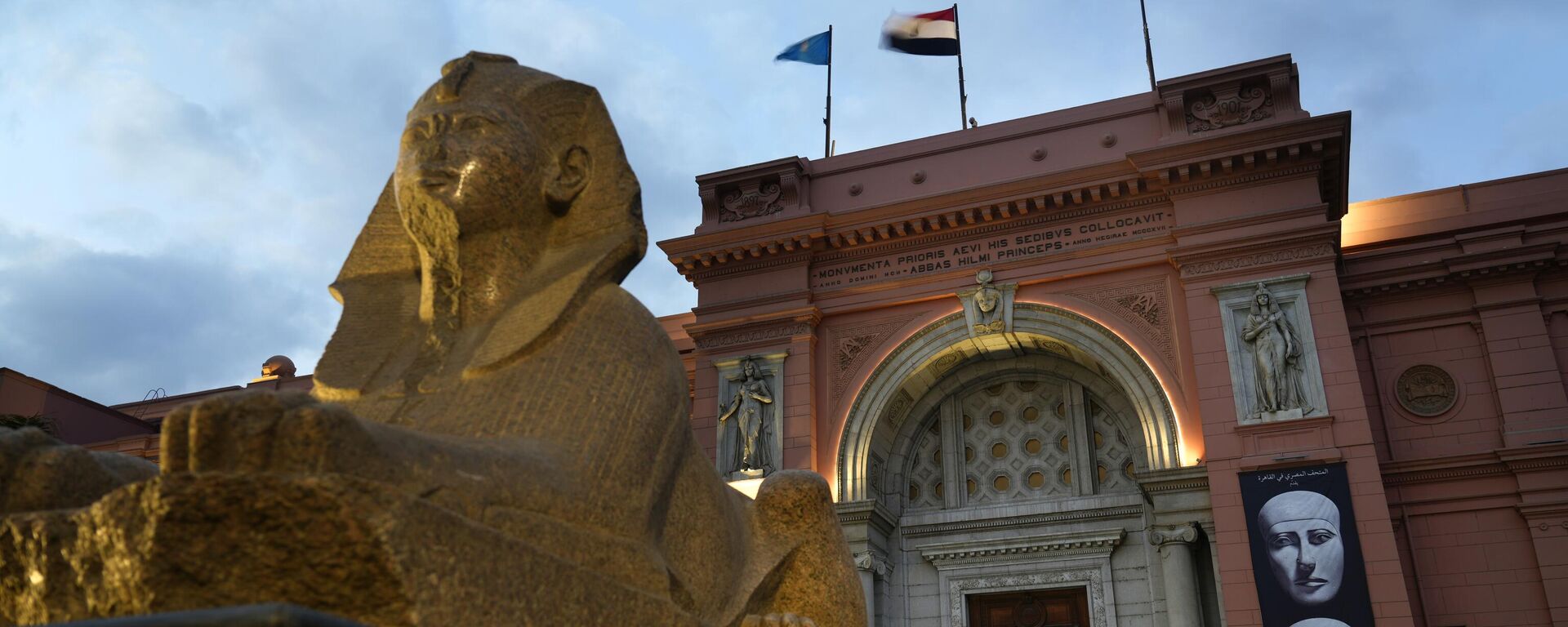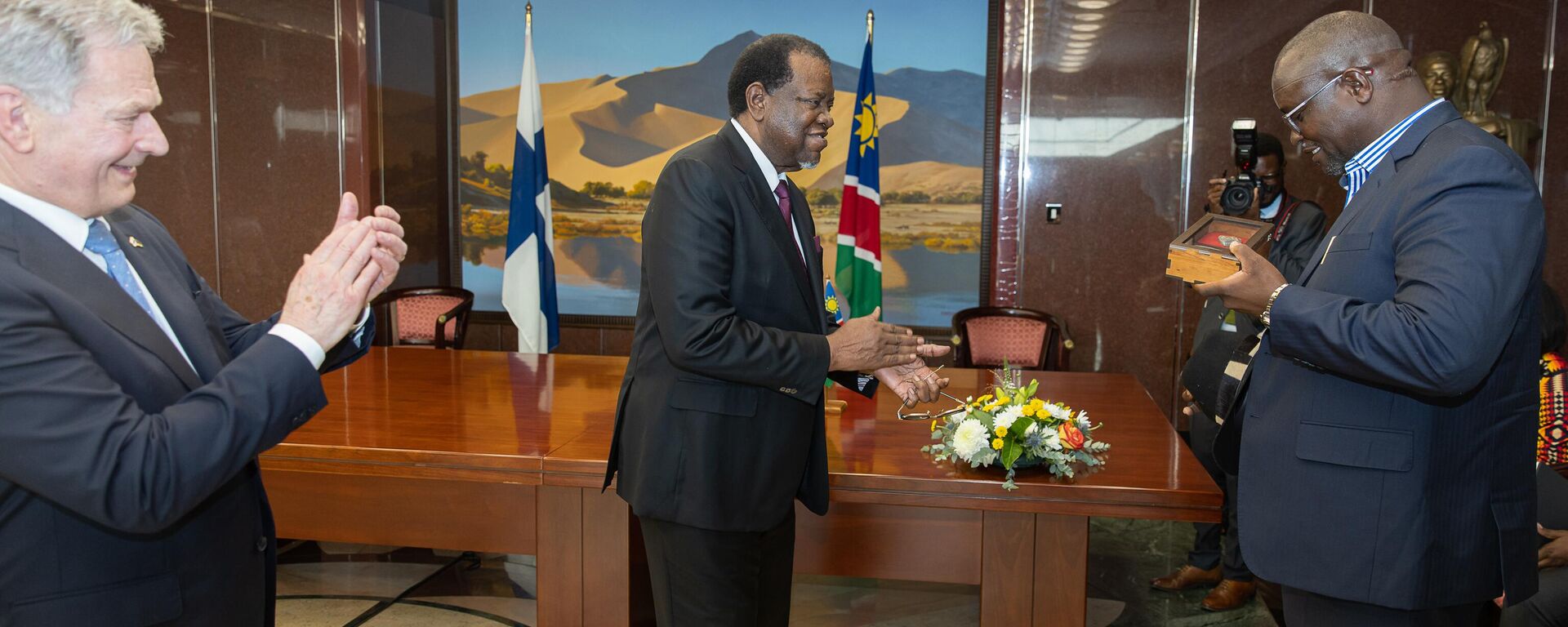https://en.sputniknews.africa/20230511/how-africa-is-digitalizing-its-cultural-heritage-1059189089.html
How Africa is Digitalizing Its Cultural Heritage
How Africa is Digitalizing Its Cultural Heritage
Sputnik Africa
Sputnik takes a look at other major digital initiatives launched on the continent aimed at preserving cultural heritage and cementing the place of African culture in the era of digital technologies.
2023-05-11T18:39+0200
2023-05-11T18:39+0200
2023-07-16T18:53+0200
features
digital technology
heritage
technology
benin bronzes
culture
https://cdn1.img.sputniknews.africa/img/07e7/05/0b/1059190787_0:144:3131:1905_1920x0_80_0_0_8a3f32c1f9c99d385caeaa0dbfd94e1a.jpg
South Africa's Nelson Mandela Foundation and Glorious Digital launched an initiative that put together the work of the country's first black president and most prominent anti-apartheid activist into one digital platform this May 11.The project allows those interested in Mandela's deeds and legacy, to utilize the rich archives of the foundation, including images, information and events documenting his life. The funds generated from the portal will be allocated toward supporting the foundation. On this occasion, Sputnik takes a look at other digitalization initiatives launched on the continent aimed at preserving cultural heritage and cementing the place of African culture in the era of digital technologies. 'A Window Into the Past' by the Zamani Project One of the continent's major digital initiatives, the Zamani Project, presents digital collections of tangible archaeological, cultural and anthropological sites from across the globe and in particular from Africa. The initiators of the project operate as a research group within the University of Cape Town, South Africa.According to information on its official website, heritage provides "a window into the past" that helps to understand present times and outline perspectives for the future. Since its inception over 15 years ago, the project in collaboration with international heritage organizations such as UNESCO has managed to document over 250 structures, monuments and statues at about 65 heritage sites in 18 states across Africa, the Middle East and Southeast Asia. The site gives an opportunity to explore numerous architectural and cultural sites through panorama tours, 3D models and videos. For example, the historical sites presented on the Zamani's website include stone-carved Christian churches in Ethiopia's Lalibela and monuments of Great Zimbabwe. One can get a picture of Aksum, a city in northern Ethiopia, and its famous stelas, by observing detailed 3D models and maps of the stelae fields. Database of Benin Bronzes Last year, the Digital Benin platform launched the most complete digital database of traditional West African art objects, known as the Benin Bronzes, of the Edo culture. The Benin Bronzes are centuries-old sculptures that once adorned the palace of the former Kingdom of Benin (modern-day Nigeria), which was attacked and looted by British colonists. The bronzes, as well as other stolen artifacts, were then sold to various countries. By providing the history of the artifacts, the project looks to raise global awareness on the need for repatriation of African cultural heritage. According to its international team of creators, about 5,000 of the objects presented in the database were possibly stolen, while the origin of some 400 items remains unclear. The main sources of the project are data provided by 131 museums in 20 countries. Some of the institutions that participated in the creation of the database, including Berlin's Ethnological Museum, Washington's Smithsonian Institution, and Oxford and Cambridge Universities, have returned Benin Bronzes in their possession to Nigeria, or at least promised to do so.A Virtual Museum of African HeritageApart from projects that display virtual copies of famous cultural and historical sites, there are some initiatives on the continent aimed at presenting virtual models of museums. For instance, Ghana's Pan African Heritage Museum provides a digital virtual version on the Internet. The interactive site of the museum provides access to art, artifacts, and commentaries by leading scholars, by organizing virtual museum tours. In its exhibition "African Civilizations – Granaries of Memory" the museum alows visitors to take part in a multimedia and immersive tour into the history of African civilizations, and examine their art and legacy, observe masks, statuaries, maps and archival documentation. The digital museum invites netizens to absorb African culture by exploring various African civilizations, including Ancient Egypt, the kingdoms of Kush, Benin, Songhai, Congo, Zulu and many more. 'World Heritage Futures Lab' in NamibiaThe digital revolution is also redefining the way African nations preserve, protect and promote their World Heritage Sites for generations to come. This January, Namibia launched the "World Heritage Futures Lab: Southern and Eastern Africa edition," a project aimed at developing and disseminating digital content on the World Heritage Sites in Africa to deepen public knowledge and appreciation of their value. It is intended to create "new narratives" about World Heritage in southern and eastern Africa through the creation of innovative and engaging digital products, including using extended reality (XR) technology. The project, promoted by the International Centre for the Study of the Preservation and Restoration of Cultural Property, highlights that digital technologies provide an opportunity to learn more about the African World Heritage sites, easily monitor the conservation of, or transmit the practices and knowledge linked to the preservation of these unique sites.African Digital Heritage: Creating 'Digital Futures for African Histories'Another major initiative has been launched by the African Digital Heritage, a Nairobi-based, non profit organization working to promote innovative and digital solutions to protect African heritage. It aims to preserve the continent's heritage by the creation of a digital oral and visual history archives.The organization has launched numerous projects on the preservation of African cultural objects and historical sites. Among them, for example, are the project aimed at documenting information on Kenya's railway stations or scanning the country's famous Gede ruins. Another initiative, the McMillan Memorial Library Digitization project in particular addresses the threat of climate change to valuable cultural heritage in such countries as Ethiopia, Kenya, Tanzania and Uganda through the means of digital innovation.
https://en.sputniknews.africa/20221219/1058914518.html
https://en.sputniknews.africa/20230509/italy-returns-four-smuggled-ancient-artifacts-to-egypt-1059140137.html
https://en.sputniknews.africa/20230428/finland-returns-namibian-sacred-stones-seized-during-colonial-times-1058914013.html
Sputnik Africa
feedback@sputniknews.com
+74956456601
MIA „Rossiya Segodnya“
2023
News
en_EN
Sputnik Africa
feedback@sputniknews.com
+74956456601
MIA „Rossiya Segodnya“
Sputnik Africa
feedback@sputniknews.com
+74956456601
MIA „Rossiya Segodnya“
sub-saharan africa, african culture, heritage, digitalization, virtual, preservation, digital technologies
sub-saharan africa, african culture, heritage, digitalization, virtual, preservation, digital technologies
How Africa is Digitalizing Its Cultural Heritage
18:39 11.05.2023 (Updated: 18:53 16.07.2023) In a world of rapidly evolving technology, countries tend to digitalize their cultural and natural heritage to preserve it and make it endure generations. By digitalizing various material objects of significant historical or cultural value, nations aim to showcase their culture, and perpetuate it in the digital realm.
South Africa's Nelson Mandela Foundation and Glorious Digital launched an initiative that put together the work of the country's first black president and most prominent anti-apartheid activist into one digital platform this May 11.
The project allows those interested in Mandela's deeds and legacy, to utilize the rich archives of the foundation, including images, information and events documenting his life. The funds generated from the portal will be allocated toward supporting the foundation.
On this occasion,
Sputnik takes a look at other digitalization initiatives launched on the continent aimed at preserving cultural
heritage and cementing the place of African culture in the era of digital technologies.
'A Window Into the Past' by the Zamani Project
One of the continent's major digital initiatives, the Zamani Project, presents digital collections of tangible archaeological, cultural and anthropological sites from across the globe and in particular from Africa. The initiators of the project operate as a research group within the University of Cape Town, South Africa.
According to information on its official website, heritage provides "a window into the past" that helps to understand present times and outline perspectives for the future. Since its inception over 15 years ago, the project in collaboration with international heritage organizations such as UNESCO has managed to document over 250 structures, monuments and statues at about 65 heritage sites in 18 states across Africa, the Middle East and Southeast Asia.
The site gives an opportunity to explore numerous architectural and cultural sites through panorama tours, 3D models and videos. For example, the historical sites presented on the Zamani's website include stone-carved Christian churches in Ethiopia's Lalibela and monuments of Great Zimbabwe. One can get a picture of Aksum, a city in northern Ethiopia, and its famous stelas, by observing detailed 3D models and maps of the stelae fields.
Database of Benin Bronzes
Last year, the Digital Benin platform launched the most complete digital database of traditional West African art objects, known as the Benin Bronzes, of the Edo culture. The
Benin Bronzes are centuries-old sculptures that once adorned the palace of the former Kingdom of Benin (modern-day Nigeria), which was attacked and looted by British colonists. The bronzes, as well as other stolen artifacts, were then sold to various countries.
By providing the history of the artifacts, the project looks to raise global awareness on the need for repatriation of African cultural heritage. According to its international team of creators, about 5,000 of the objects presented in the database were possibly stolen, while the origin of some 400 items remains unclear.
The main sources of the project are data provided by 131 museums in 20 countries. Some of the institutions that participated in the creation of the database, including Berlin's Ethnological Museum, Washington's Smithsonian Institution, and Oxford and Cambridge Universities, have returned Benin Bronzes in their possession to Nigeria, or at least promised to do so.
A Virtual Museum of African Heritage
Apart from projects that display virtual copies of famous cultural and historical sites, there are some initiatives on the continent aimed at presenting virtual models of museums. For instance, Ghana's Pan African Heritage Museum provides a digital virtual version on the Internet. The interactive site of the museum provides access to art, artifacts, and commentaries by leading scholars, by organizing virtual museum tours.
In its exhibition "African Civilizations – Granaries of Memory" the museum alows visitors to take part in a multimedia and immersive tour into the history of African civilizations, and examine their art and legacy, observe masks, statuaries, maps and archival documentation.
The digital museum invites netizens to absorb African culture by exploring various African civilizations, including
Ancient Egypt, the kingdoms of Kush, Benin, Songhai, Congo, Zulu and many more.
'World Heritage Futures Lab' in Namibia
The digital revolution is also redefining the way African nations preserve, protect and promote their World Heritage Sites for generations to come. This January,
Namibia launched the "World Heritage Futures Lab: Southern and Eastern Africa edition," a project aimed at developing and disseminating digital content on the World Heritage Sites in Africa to deepen public knowledge and appreciation of their value.
It is intended to create "new narratives" about World Heritage in southern and eastern Africa through the creation of innovative and engaging digital products, including using extended reality (XR) technology.
The project, promoted by the International Centre for the Study of the Preservation and Restoration of Cultural Property, highlights that digital technologies provide an opportunity to learn more about the African World Heritage sites, easily monitor the conservation of, or transmit the practices and knowledge linked to the preservation of these unique sites.
African Digital Heritage: Creating 'Digital Futures for African Histories'
Another major initiative has been launched by the African Digital Heritage, a Nairobi-based, non profit organization working to promote innovative and digital solutions to protect African heritage. It aims to preserve the continent's heritage by the creation of a digital oral and visual history archives.
The organization has launched numerous projects on the preservation of African cultural objects and historical sites. Among them, for example, are the project aimed at documenting information on Kenya's railway stations or scanning the country's famous Gede ruins. Another initiative, the McMillan Memorial Library Digitization project in particular addresses the threat of climate change to valuable cultural heritage in such countries as Ethiopia, Kenya, Tanzania and Uganda through the means of digital innovation.




